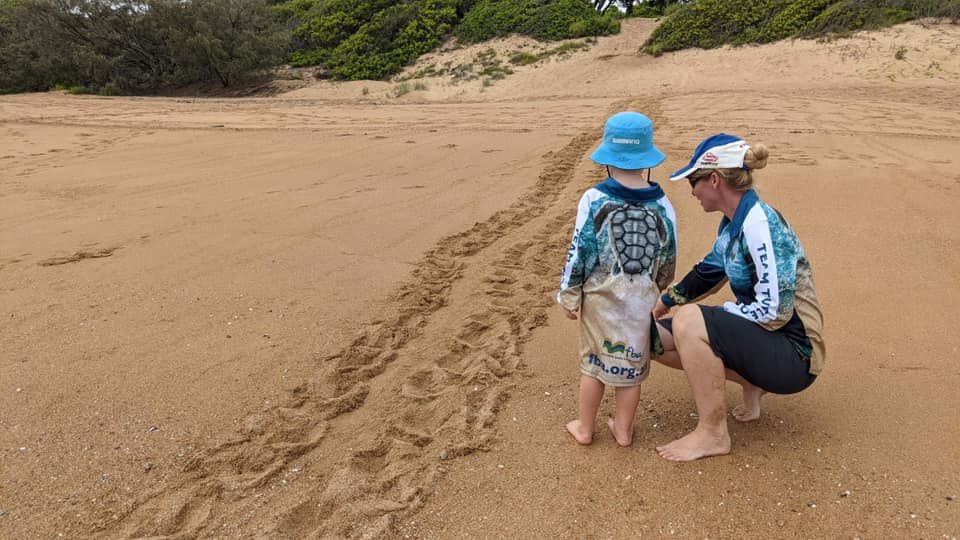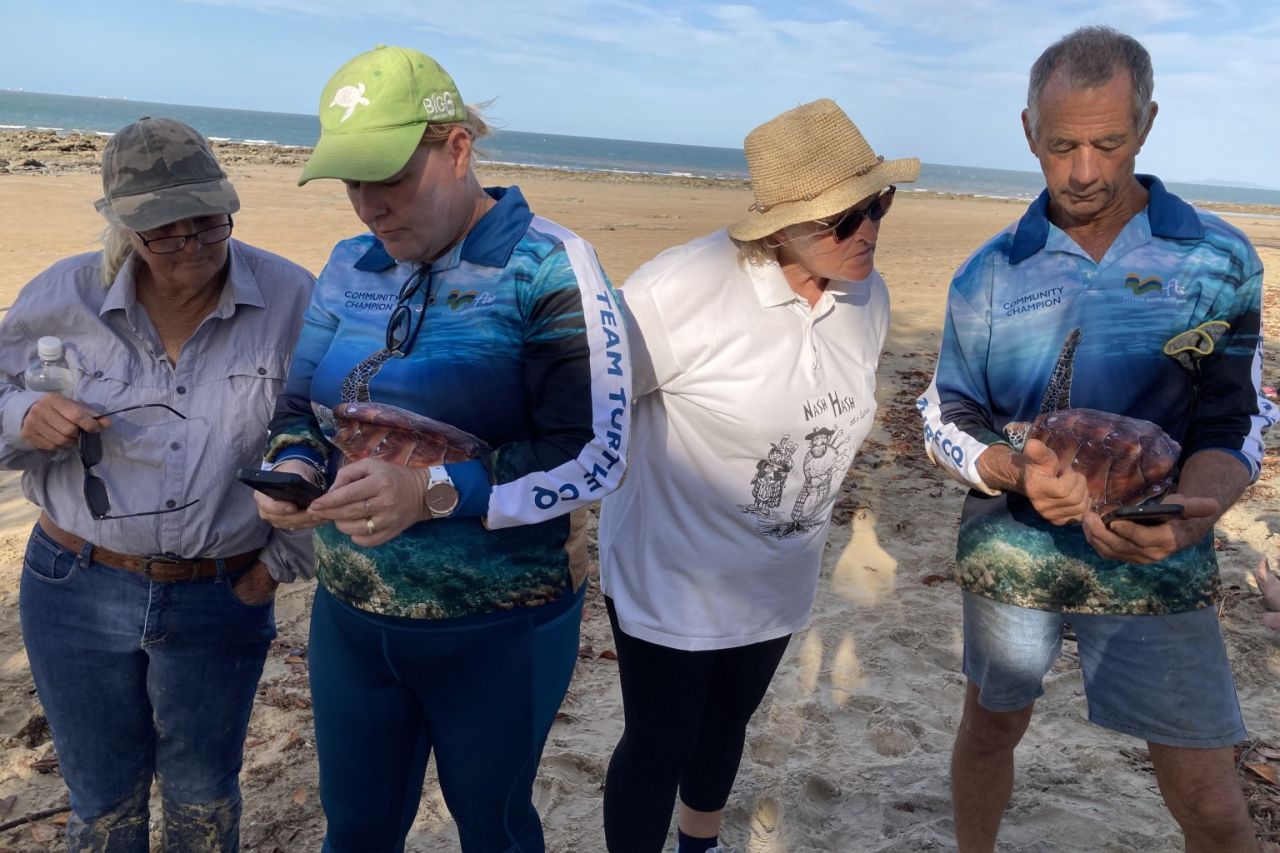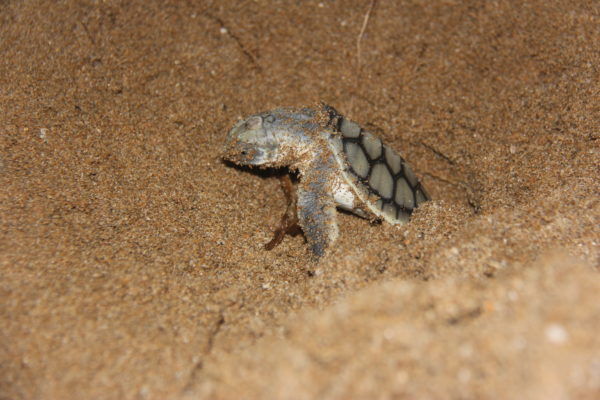Project News ·
Citizen Science project wrap: Stories of impact
Team Turtle CQ
Impact Summary (Project funded mid-2019 and wrapped mid-2021)
The Fitzroy Basin Association Team Turtle CQ Project empowered community volunteers to participate in citizen science, recording data on nesting marine turtles along the Capricorn and Curtis coasts of Central Queensland. Volunteers recorded turtle nests, hatchling tracks and evidence of threats such as predators, light glow and tyre tracks, and the data was uploaded into the BioCollect App and provided to the Queensland Turtle Conservation Program. The project also delivered a behaviour change campaign to help implement on-ground action to improve four-wheel drive practices to protect turtle nesting beaches.

Project Impact Story
Central Queensland provide important foraging grounds for six threatened marine turtle species (green, loggerhead, hawksbill, flatback and olive ridley turtles).
The Team Turtle project launched in 2015 addressing an identified need to fill a gap in turtle nesting and hatchling success data along the Capricorn and Curtis Coasts. Fitzroy Basin Association (FBA) is the proud host of the program, engaging local volunteers to record data on marine turtle nesting and hatchling behaviours.
From 2019-2021 the program made significant growth. This included a steady increase of passionate volunteers monitoring remote and previously unrecorded beaches, new educational opportunities and a streamlined and formalised update to the groups data collection processes. The program also started exploring new opportunities to drive community-led conservation actions.
To maintain healthy marine turtle populations, dedicated volunteers collect essential data that informs local protection and management plans and procedures. Walking along local beaches, volunteers record nesting turtle tracks, successful nests or nest attempts and also presence of threats including evidence of predators (foxes,goannas etc.), 4WD tracks or light impacts.

Volunteers in the field practicing data collection using the Atlas of Living BioCollect App app. Credit: Fitzroy Basin Association.
"Over the last two years, the project has transitioned from volunteers participating to volunteers stepping into leadership roles to influence changes in our community’s stewardship. It’s more than data collection. The power of community has led to shared discussion on how best to support marine turtles by addressing human behaviours that impact on health, nesting and hatching. Empowering volunteers leads to a more sustained approached to conservation. Valued volunteers will continue to contribute, and with more long-term volunteers, the more positive impact we can create."
Rebecca French, Engagement Manager, Fitzroy Basin Association
In addition to volunteer leadership, FBA program managers indicate that the growth of the volunteerism is driven by increased rigour around the data collected through the program, additional volunteer training, expanding coverage spatially and collecting more extensive data.
From October to March each year volunteers record nesting turtle tracks, successful nests, nest attempts and the presence of threats including evidence of predators and human influences through the Atlas of Living BioCollect App.
Over two seasons of field work, more than 60 volunteers spent close to 4,000 hours monitoring beaches for turtle activity (tracks and nests) and threats. The 2019-20 season saw volunteers recording 231 nests, 1,126 hatchlings’ tracks and evidence of threats such as predators, light glow and tyre tracks. The 2020-21 season saw another 505 BioCollect surveys entered for both nesting and hatchlings data (read the summary report).
The data is provided to the Queensland Turtle Conservation Program (QTCP) which has 50 years of turtle monitoring data for Queensland and is one of the longest-running turtle monitoring projects in the World. QTCP’s data is instrumental in forming management plans for turtle species not just locally but also in adjoining waters.
In February 2021, a batch of hatchlings were saved by volunteers during a monitoring trip. The hatchlings were going in the wrong direction due to the light glow from inland. The volunteers were able to find all the turtles and direct them towards the ocean.
As a result of adaptive approaches to support continual improvement in data collection and building community leadership capacity, the program is starting to see evidence of a shift in perceptions of the value of citizen science data. The data is being used by the Queensland Turtle Conservation Program, connecting into the larger picture of marine turtle management and protection.
"When volunteers engage with citizen science, they need to see the importance of what they are doing and where the data goes, to understand the need for well collected data. For the data to lead into management decisions – it needs to be robust. The program data we’re generating is now more respected by scientists and managers."
Karl French, Marine Turtle Researcher

Turtle hatchling emerging from the nest. Credit: Fitzroy Basin Association.
The project also took immediate practical local actions to protect turtles locally. The project linked the citizen data about turtle activities, with evidence about the impact of four-wheel drive activity to positively influence community behaviour that impacts on nesting turtles.
Insights from focus groups about messaging helped to pilot a simple approach for encouraging more responsible driving practices through eye-catching beach signage.
“Our approach offered a neutral space to bring together lots of different types of people and groups to explore different actions that might have a positive influence. It helped to kick start conversations that led to action and people being able to see the results.
Lisa Del Riccio, Community Participation Officer, Fitzroy Basin Association
It proved that on a short-term basis, signage gets attention. Big and bold and captures attention – maybe not long term - but temporary interventions worked. Now we’re looking to make the sign mobile to let the message travel. That idea was a surprise."
Fitzroy Basin Associations' Team Turtle CQ project was funded by the partnership between the Australian Government’s Reef Trust and the Great Barrier Reef Foundation (2019-2021) with support from Gladstone Ports. The program commenced in 2015 and continues thanks to passionate volunteers.
#Related

Project News ·
Community at the forefront of Reef water quality protection

Project News ·


